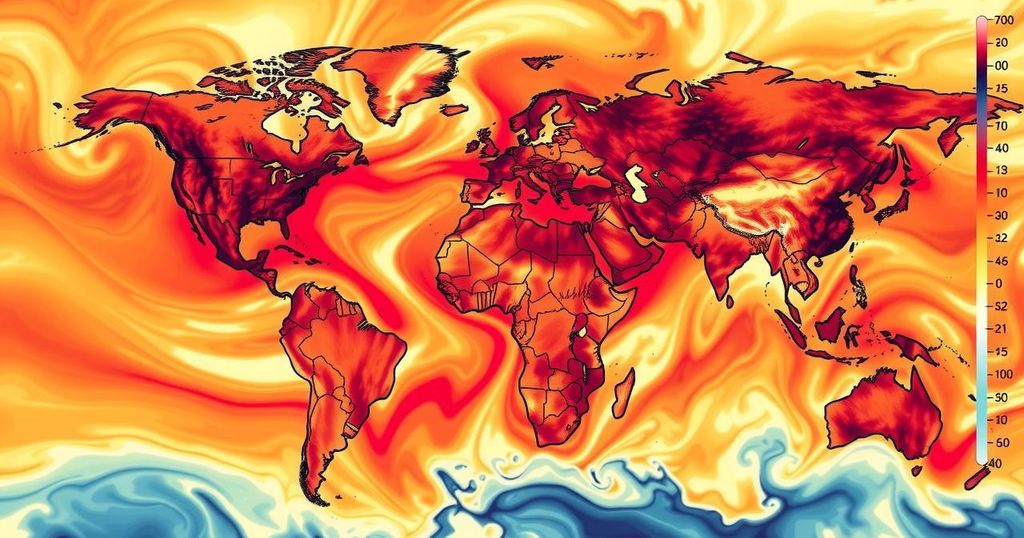Climate Change Results in 41 Additional Days of Dangerous Heat in 2024
A study by WWA and Climate Central indicates that climate change has led to 41 extra days of dangerous heat worldwide in 2024, contributing to over 3,700 deaths and mass displacements. The report stresses the need for immediate action on fossil fuel emissions and the importance of transitioning to renewable energy, while highlighting the disproportionate effects on regions like Africa. Urgent global cooperation is essential to address these challenges and improve resilience against future climate impacts.
A recent report highlights that climate change has resulted in an average increase of 41 days of dangerous heat globally in 2024. The analysis conducted by World Weather Attribution (WWA) and Climate Central indicates that this year has witnessed extreme weather events resulting in over 3,700 fatalities and the displacement of millions of individuals. Such alarming statistics demonstrate the urgent necessity for countries to transition away from fossil fuels and strengthen their preparedness for future extreme weather occurrences.
The report, titled “When Risks Become Reality: Extreme Weather in 2024,” emphasizes that human-induced climate change has exacerbated 26 out of 29 weather events analyzed, which include unprecedented floods, hurricanes, and droughts. Extreme rainfall in Kerala, along with catastrophic flooding in regions across Africa, notably Sudan and Nigeria, led to substantial loss of life and displacement. Researchers warned that continued warming, potentially leading to an increase of 2 degrees Celsius, could result in similar events becoming commonplace by the 2040s.
Specifically, Hurricane Helene, which ravaged six states in the United States, was noted to be intensified by climate change, with the ocean’s elevated temperatures making such occurrences significantly more likely. The report also highlighted the dire situation in the Amazon, where drought conditions are worsening, jeopardizing the rainforest’s vital role in carbon sequestration and biodiversity preservation.
Furthermore, the report pointed out that Africa is disproportionately affected by climate change despite contributing the least to global emissions, underscoring the need for wealthier nations to fulfill their climate finance commitments by 2025 to assist African countries in adapting to these challenges. As temperatures in the top decile of historical records (1991-2020) expose millions to health risks, scientists emphasize that without immediate action to cut fossil fuel emissions, such dangerous heat days will continue to rise.
The report advocates for four main resolutions for 2025: an expedited transition to renewable energy, enhanced early-warning systems, real-time tracking of heat-related deaths, and international financial support for developing nations facing climate-induced challenges. Dr. Friederike Otto from WWA articulated, “We have the knowledge and technology to replace fossil fuels with renewable energy and halt deforestation.”
In light of 2024 likely becoming the hottest year recorded, the authors of the report stress the urgency for global collaboration in tackling the climate crisis to mitigate further devastation in future years.
The topic revolves around the severe impacts of climate change, particularly manifested through extreme weather events that have heightened global temperatures and posed significant risks to human health and safety. Recent findings from climate research organizations, including World Weather Attribution and Climate Central, have highlighted the critical situation facing populations worldwide, necessitating a shift towards sustainable energy and increased resilience in the face of climate-induced disasters. With increasing global temperatures and the prospect of more extreme weather in the coming years, understanding these implications is essential for policymakers and global citizens alike.
In summary, the analysis reveals that climate change has significantly intensified extreme weather events globally, resulting in an alarming average of 41 additional days of dangerous heat in 2024. The ongoing crisis necessitates urgent actions from all nations to mitigate climate impacts, with particular attention to supporting vulnerable regions such as Africa. By focusing on renewable energy alternatives and enhancing preparedness for future climate challenges, the global community can work together to protect lives and reduce the adverse effects of climate change going forward.
Original Source: www.dynamitenews.com




Post Comment